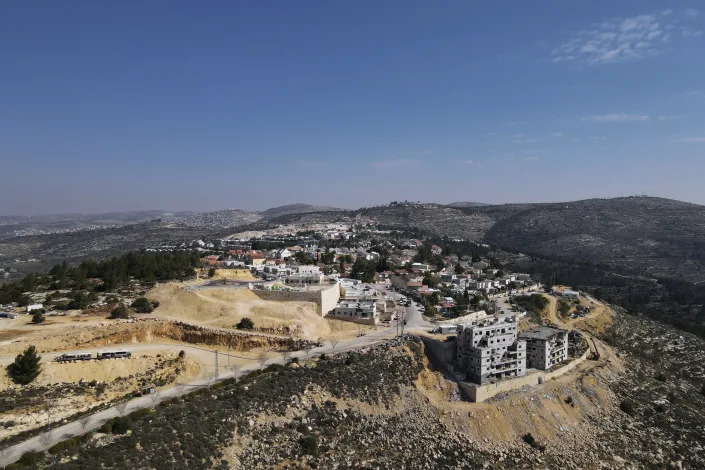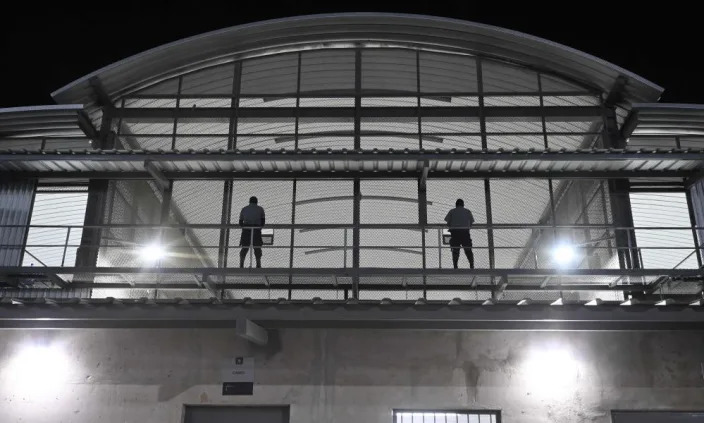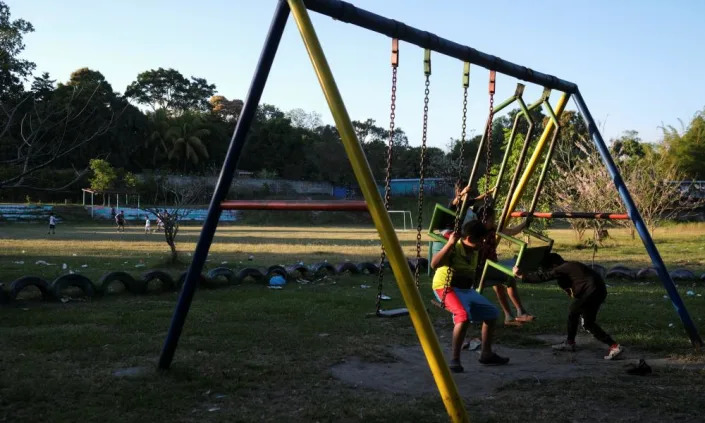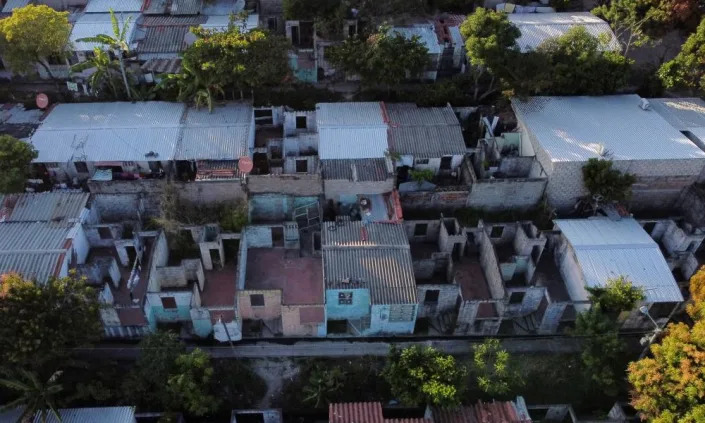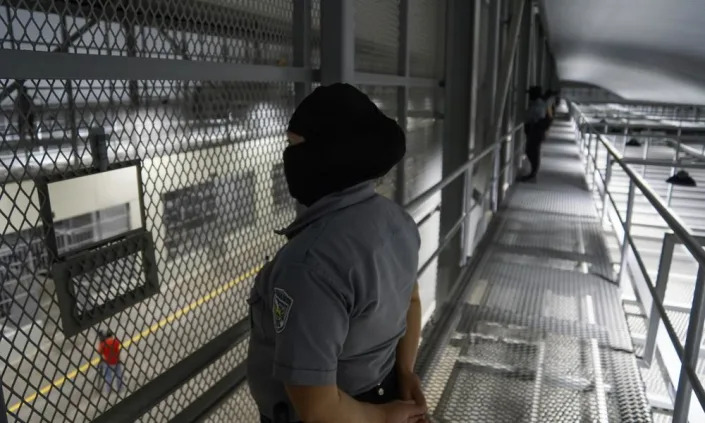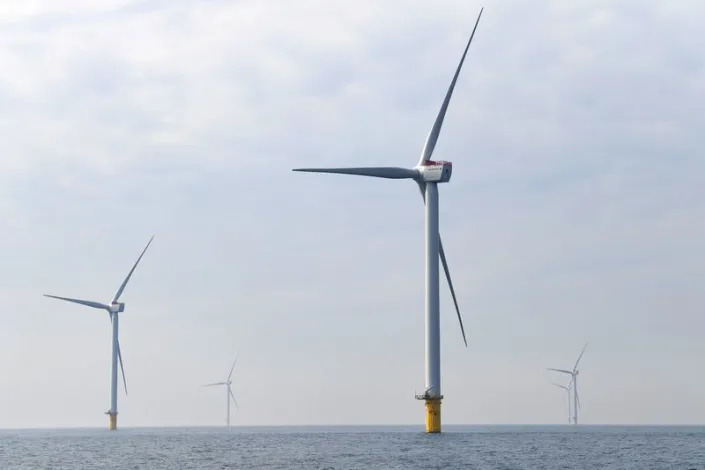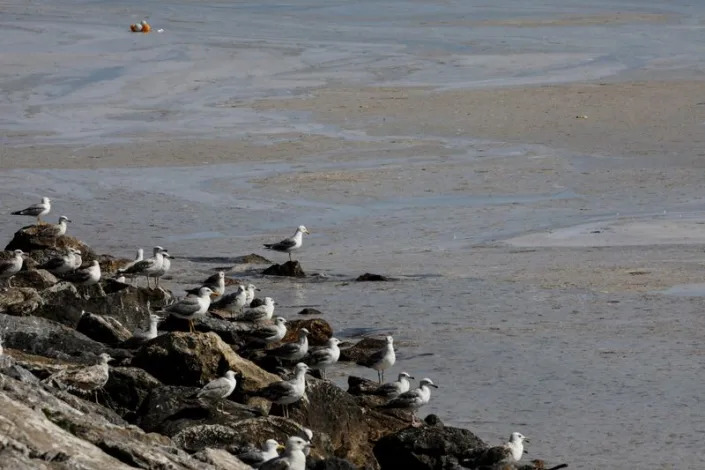Revealed: Leaked document shows how Russia plans to take over Belarus
The document, written for Putin’s Presidential Administration, envisages the total incorporation of Belarus into a “Union State” with Russia by 2030.
Michael Weiss and Holger Roonemaa
Mon, February 20, 2023
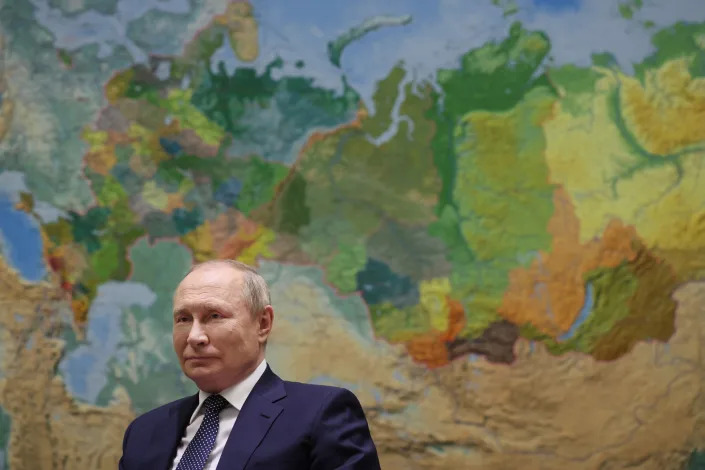
Russian President Vladimir Putin speaks in an interview last summer with the Russia-1 TV channel. (Mikhail Metzel, Sputnik, Kremlin Pool Photo via AP)
LONG READ
A leaked internal strategy document from Vladimir Putin’s executive office and obtained by Yahoo News lays out a detailed plan on how Russia plans to take full control over neighboring Belarus in the next decade under the pretext of a merger between the two countries. The document outlines in granular detail a creeping annexation by political, economic and military means of an independent but illiberal European nation by Russia, which is an active state of war in its bid to conquer Ukraine through overwhelming force.
“Russia’s goals with regards to Belarus are the same as with Ukraine,” Michael Carpenter, the U.S. ambassador to the Organization for Security and Cooperation in Europe, told Yahoo News. “Only in Belarus, it relies on coercion rather than war. Its end goal is still wholesale incorporation.”
According to the document, issued in fall 2021, the end goal is the formation of a so-called Union State of Russia and Belarus by no later than 2030. Everything involved in the merger of the two countries has been considered, including the “harmonization” of Belarusian laws with those of the Russian Federation; a “coordinated foreign and defense policy” and “trade and economic cooperation … on the basis of the priority” of Russian interests; and “ensuring the predominant influence of the Russian Federation in the socio-political, trade-economic, scientific-educational and cultural-information spheres.”
In practice, this would eliminate whatever remains of Belarus’s sovereignty and reduce a country about the size of Kansas, with 9.3 million people, to the status of a Moscow satellite. It would put Belarusians at the mercy of the Kremlin’s priorities, whether in agriculture, industry, espionage or war. And it would pose a security threat to Belarus’s European neighbors, three of which — Latvia, Lithuania and Poland — are members of NATO and the European Union.
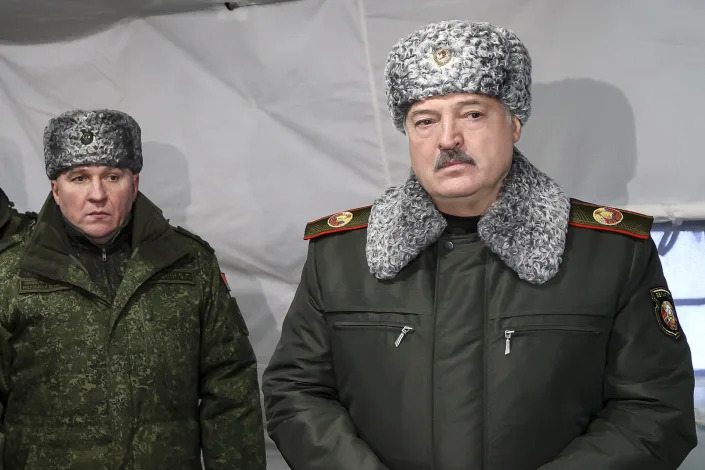
Belarusian President Alexander Lukashenko, right, attends a meeting with military top officials. (Nikolai Petrov/BelTA Pool Photo via AP)
To some observers, the strategy confirms what has long been obvious and, at times, openly acknowledged, by both Moscow and Minsk. Rainer Saks, the former head of Estonia’s Foreign Intelligence Service, told Yahoo News that “in the grand scheme of things, this document is no different from what you might think Russia wants from Belarus. Of course, Russia will take control of Belarus, but the question is if it does so at the cost of independence. It is surprising to me why this target — 2030 — is set so far ahead. Why should Russia wait so long?”
“The ‘Union State’ is a threat for the Belarusian people and Belarusian statehood,” said Svetlana Tsikhanovskaya, the Belarusian opposition leader who lives in exile in Lithuania after contesting the last election. “It is not a union of equals. It is a roadmap for the absorption of Belarus by Russia. Since our goal is to return Belarus to the path of democracy, it will be impossible to do so in a Union State with Russia.”
The Kremlin did not respond to Yahoo News’ request for comment.
The strategy document, never before made public, was obtained by an international consortium of journalists from Yahoo News, Delfi Estonia, the London-based Dossier Center, the Swedish newspaper Expressen, the Kyiv Independent, Germany’s Süddeutsche Zeitung, and the German radio networks Westdeutscher Rundfunk and Norddeutscher Rundfunk, the Polish investigative outlet Frontstory, the Belarusian Investigative Center and Central European news site VSquare.
The authorship of the strategy document, according to one Western official with direct knowledge of its construction, belongs to the Presidential Directorate for Cross-Border Cooperation, a subdivision of Putin’s Presidential Administration, which was established five years ago. The rather innocuously named directorate’s actual task is to exert control over neighboring countries that Russia sees as in its sphere of influence: Estonia, Latvia, Lithuania, Belarus, Ukraine and Moldova.
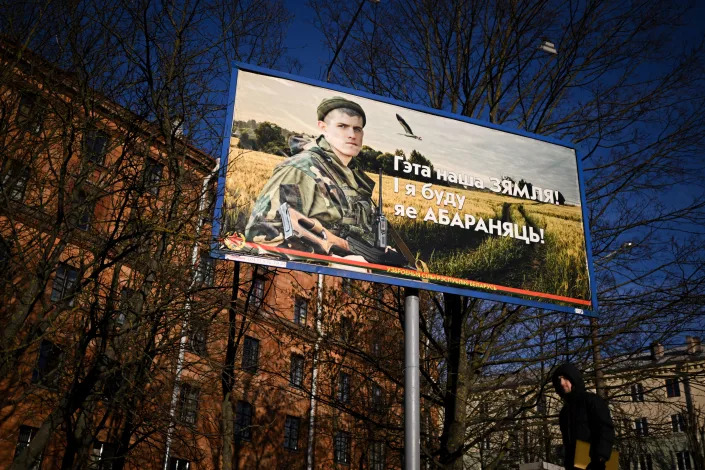
A man walks past a billboard in Minsk reading, in Belarusian: "This is our land! and I will protect it!" last week. (Natalia Kolesnikova/AFP via Getty Images)
The directorate is headed by Alexey Filatov, who reports directly to Dmitri Kozak, the deputy chief of the Presidential Administration. Filatov’s team was tasked to come up with new strategies that would detail Russia’s strategic goals in all six countries, relying on the resources and input of most of the vital Russian state institutions. According to a Western intelligence officer with direct knowledge of the strategy document, Russia’s domestic, foreign and military intelligence services — the FSB, SVR, GRU, respectively — in addition to the General Staff of the Armed Forces, all actively contributed to the Union State plan. The resulting document was presented to Kozak in the fall of 2021, the same source told Yahoo News.
Like all six countries in the directorate’s purview, Belarus was once part of the Soviet Union. But whereas Ukraine and the Baltic states turned toward Europe and Western-style democracy, Belarus has been lorded over for three decades by a reliable Russian ally in the form of Belarusian President Alexander Lukashenko, often referred to as “Europe’s last dictator.”
Lukashenko won the presidency in 1994 and has never relinquished it, through a succession of elections, none of which has ever been deemed free by international monitors. Especially egregious was Lukashenko’s last election, in 2020, when a mass protest movement took to the streets, denouncing it as stolen. Both the U.S. and EU no longer recognize Lukashenko as Belarus's legitimate president as a result. Lukashenko’s rivals, including Tsikhanovskaya, have been driven into exile or prison. Human Rights Watch has documented instances of torture of Belarusian dissidents and pro-democracy activists in its prisons, including the use of electric shock and rape.
The concept of a Union State was first introduced in the mid-1990s, in the form of a treaty designed to politically, economically and culturally integrate Russia and Belarus. A federation modeled on the former Soviet Union was created in 1999 with its own governing institutions, including a council of ministers, parliament and high court. But the project fizzled, and full implementation wasn’t discussed in earnest again until 2018, to coincide with Putin’s aggressive geopolitical ambitions.
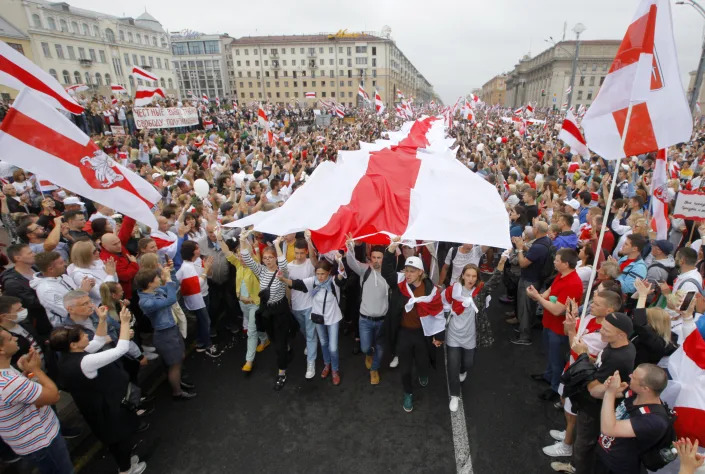
Demonstrators in Minsk protest against Lukashenko after he extended his 26-year rule in a vote the opposition saw as rigged. (AP/Dmitri Lovetsky)
“The Union State was an old legacy of Belarus’s own ambitions, when [Boris] Yeltsin’s weak-handed Russia was in a crisis and Lukashenko, in power since 1994, tried to squeeze as much as possible out of Russia,” according to Anton Bendarjevskiy, a Belarusian foreign and security policy expert based in Hungary. “After Putin came to power, Lukashenko's hopes were dashed, and the union treaty sat on the shelf for nearly two decades. It was dusted off by Putin shortly after his annexation of Crimea, in the face of opposition from his allies.”
In November 2021, Lukashenko and Putin signed an agreement allowing for 28 integration programs, mainly focused on economic and regulatory questions. They also inked a joint military doctrine. Left out were the political aspects of fusing the two countries.
And while other neighbors of Ukraine were horrified by Moscow’s brutal invasion last year, Lukashenko remains one of the few outward geopolitical partners of an increasingly isolated Russia.
On the eve of Russia’s invasion of Ukraine, President Biden said the Russian leader “wants to, in fact, reestablish the former Soviet Union.” Putin certainly seems dead-set on doing so outside of the areas denied to him because they are members of NATO or the European Union.
Russia has been steadily encroaching on the territory of its neighbors, with an emphasis on Russian-speaking populations. Putin invaded and illegally annexed Ukraine’s Crimean peninsula in 2014. That year, the Kremlin fomented, armed and financed a “separatist” movement in Donbas, in eastern Ukraine, drawing from a well-tested playbook for hybrid warfare already long in use in the breakaway territories of Abkhazia and South Ossetia in Georgia, and in Transnistria, Moldova, where 1,500 Russian troops are currently garrisoned. In September 2022, Russia announced it was annexing four regions in southern and eastern Ukraine last year, even as its military was being pushed back in those very areas.
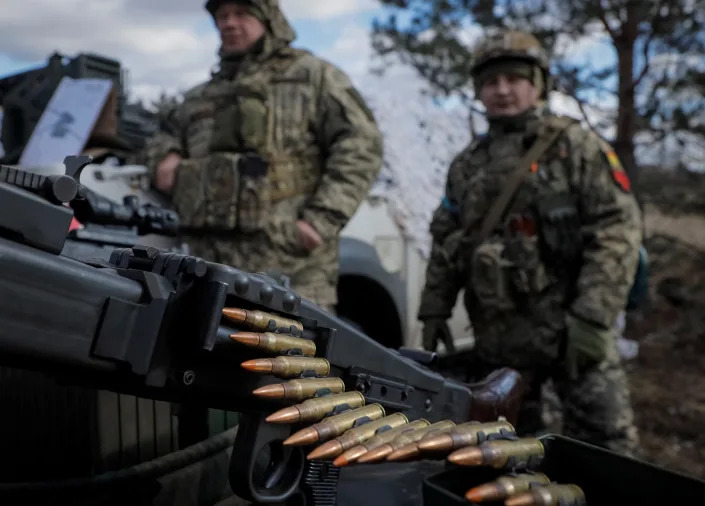
Ukrainian servicemen attend joint military drills near the border with Belarus on Monday. (Reuters/Ivan Lyubysh-Kirdey)
Rumors abound that Belarus will directly join Putin’s war against Ukraine, after allowing its territory to serve as a launchpad for the invading Russian military and ongoing fusillades of Russian rockets and drone attacks on Ukraine. Doing so would further link Lukashenko’s fortunes with Moscow and open up his regime to even further isolation and sanctions from the West.
The leaked document also outlines how Russia’s military presence in Belarus will expand to feature a joint command system and Russian weapons depots. Such a development would be deeply concerning to the NATO members along Belarus’s western border.
“If a strong Russian air defense force is permanently deployed in Belarus, it will also change the defense calculus for Poland, because the Russian-Belarusian force can intercept missiles from Poland from Belarusian territory,” according to András Rácz, a senior research fellow at the German Council on Foreign Relations. “The question from the Visegrad Group side,” Rácz said, referring to the Central European umbrella of the Czech Republic, Hungary, Poland and Slovakia, “is whether combat capable troops will be permanently stationed in Belarus. They already have Russian military objects, but no Russian military bases.”
Anna Maria Dyner, an analyst at the Polish Institute of International Affairs, a Warsaw-based think tank, said Russia's strategic goal is to maintain a permanent Russian military presence in Belarus. “This basically guarantees the realization of the remaining strategic goals of taking political and economic control of the country. This situation guarantees Russia an increase in security stability, that is, first of all, some cover from NATO countries, while flanking the military operation in Ukraine,” she said.

The exiled Belarusian opposition leader Sviatlana Tsikhanouskaya in Helsinki, Finland, on Dec. 13, 2022.(Lehtikuva/Heikki Saukkomaa via Reuters)
The Belarus strategy document is divided into two parts. The first lists Russia’s goals in the short-term (2022), mid-term (2025) and long-term (2030). These are categorized into three sectors: the political, military and defense sectors; the humanitarian sector; and trade and economy. The second part of the document identifies risks associated with the goals.
For example, the document advocates the “formation of pro-Russian sentiments in political and military elites and the population” by 2022, while at the same time “limiting the influence of ‘nationalist’ and pro-Western forces in Belarus.” It also envisages the completion of the constitutional reform in Belarus that would be predicated on Russian priorities. Such reforms are in keeping with what has already taken place in Belarus in the last year.
In February 2022, Lukashenko held a referendum based on amendments to Belarus’s constitution. Among the proposed changes was removing the stated neutrality of Belarus from its constitution — one of several provisions that the BBC characterized as concessions to Putin. The referendum passed.
By 2025, the strategy document states, there need to be “sustainable pro-Russian groups of influence in Belarusian politics, military and business.” It also advocates the expansion of Russian military presence in Belarus and the introduction of a simplified procedure for issuing Russian passports to Belarusian citizens.
A Western military officer who was not authorized to speak on the record told Yahoo News that “passportization” is one of the key processes Russia uses to quietly take over sovereign territory. “They used it in Abkhazia as well as in South Ossetia and Eastern Ukraine,” the officer said. “They hand out Russian passports to local people in order to extend their interests in the regions. When needed, they can use their compatriots' rights as a justification to intervene with force.”
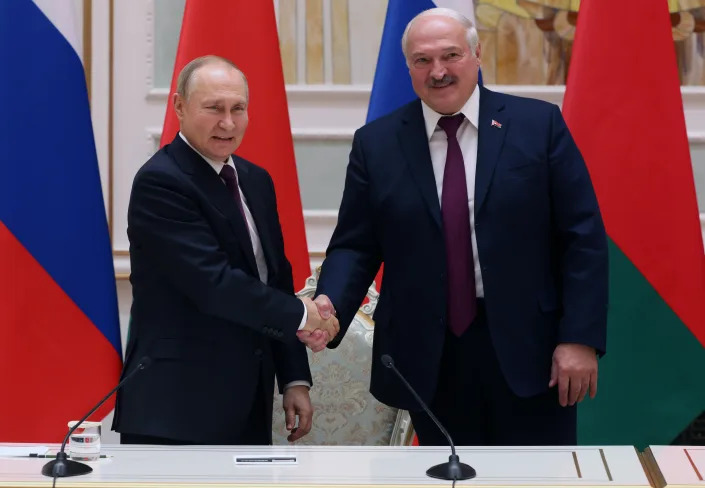
Putin and Lukashenko shake hands before a press conference in December 2022 in Minsk. (Contributor/Getty Images)
The Kremlin has made no secret of its “compatriots policy,” which has evolved to include not just ethnic Russians but anyone who speaks the Russian language. Russian Foreign Minister Sergei Lavrov wrote in an article for Russian newspaper Rossiyskaya Gazeta in 2015 that offering “comprehensive support” to Russian speakers outside Russian Federation territory was “an unconditional foreign-policy priority for Russia.”
Belarus’s political establishment is to eventually fall under the dominion of “stable pro-Russian groups of influence,” the document states. But it’s not only political and military control that Russia wants to have over Belarus.
Another unmistakable aspect of Russia’s slow-motion state capture is the introduction of a single monetary currency. While the document doesn’t explicitly state that this would be the Russian ruble, the implication is obvious, given Russia’s hegemonic role in the relationship.
Indeed, the general context of the strategy doesn’t leave much room for interpretation that Moscow is seeking to gobble up Minsk’s marketplace. The majority of Belarusian exports have always gone to Russia, but with the introduction of Western sanctions on Lukashenko’s government, they became even more crucial. Russia has also propped up its economically straitened neighbor in the form of loans and budget transfers.
Energy integration is another factor for the pending Union State. The document implies that Ostrovets 1, Belarus’s lone nuclear reactor, which was financed by Russia’s state-owned atomiс energy corporation, is intended to be enlisted in a power-sharing scheme between the two countries. Belarus already imports its gas from Russia. According to Dzmitry Kruk, a senior researcher at BEROC, a leading Belarusian economic think tank, currently based in Kyiv, “Russia remains in control of the Belarusian energy sector, further deepening the country’s dependence on Russia. And Belarus will also have to pay for it.” The document also redirects the landlocked Belarus’s cargo shipping from its Baltic neighbors to Russian ports.

Cadets of the Military Academy of the Republic of Belarus stand by a tank near Zhodino, in the Minsk region, on Friday. (Natalia Kolesnikova/AFP via Getty Images)
A significant part of Russia’s strategy for Belarus focuses on what the document calls “the humanitarian sphere,” a euphemism for Russianizing and controlling the country’s civil society. One stated long-term objective is doubling the number of Belarusian students studying in Russian universities, or “opening of new centers of science and culture” in the Belarusian cities of Mogilev, Grodno and Vitebsk. These centers would be branches of Rossotrudnichestvo, a Russian cultural outreach organization that technically operates under the auspices of Russia’s Foreign Ministry. However, Rossotrudnichestvo is a notorious clearinghouse for Russian intelligence operatives and agents of influence, making Moscow’s capacity to recruit Belarusians to its security organs that much easier.
The Union State program calls for the creation of a network of Moscow-friendly nongovernmental organizations (NGOs), with financial and legal support from Russia to keep them running. This, too, would pose new international security headaches for NATO and the EU. “The Kremlin has long used dirty money, banks, companies, NGOs and law firms to support malign and subversive activities in the West,” John Sipher, a former CIA officer focused on Russia, told Yahoo News. “They’ve had an even easier time in the Russian-speaking countries in their periphery, and what this document outlines is what they’d have liked to do in Ukraine before the war and probably still think they can do now.”
By 2030, the strategy document states, Russia must have “control of the information space” and must establish “a single cultural space” and “common approach to the interpretation of history” in Belarus. One key deliverable in this realm is the predominance of the Russian language over Belarusian — something already largely in place. Russian is enshrined in the Belarusian constitution as one of two state languages. According to a 2019 census, more than 60% of Belarusians claimed Belarusian as their native tongue, but more than 70% of the country indicated that they also speak Russian at home.
Belarus’s government is also drifting towards Russia. Lukashenko foreclosed on Belarus’s cooperation with Europe after he brutally suppressed the mass protests after the 2020 election. The Organization for Security and Cooperation in Europe subsequently concluded that the election was “falsified and that massive and systematic human rights violations have been committed by the Belarusian security forces in response to peaceful demonstrations and protests.”
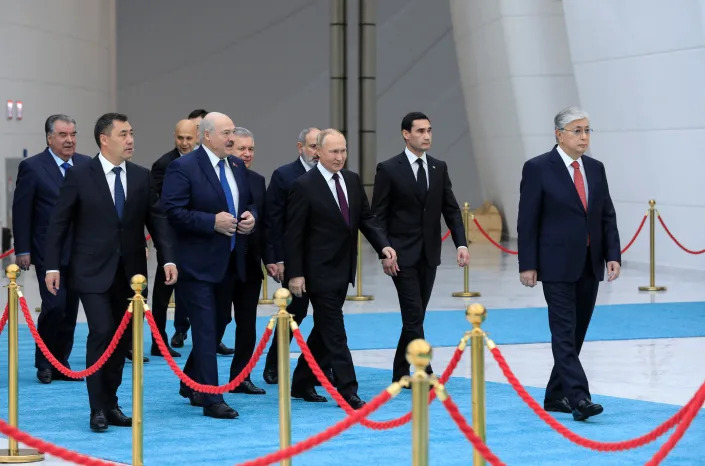
Vladimir Putin and the leaders of Kazakhstan, Turkmenistan, Armenia, Uzbekistan, Kyrgyzstan, Tajikistan and Belarus (Lukashenko is on Putin's right) attend a 2022 summit. (Reuters/Mukhtar Kholdorbekov)
“If it were not for Putin, Lukashenko would not have survived,” Tsikhanouskaya, the opposition leader, told Yahoo News. “Therefore, Lukashenko is now repaying [Putin] with Belarus’s sovereignty.”
One Western intelligence source added: “Lukashenko always kept an open mind toward the West. That only changed with the 2020 election and the following demonstrations. Since then, he owes his power only to the FSB, which rushed to help the [Belarusian] KGB. Putin never made a secret of his Greater Russia idea, and he will do everything to prevent Belarus from opening up to the West.”
There are also signs, according to analysts and government officials, that Lukashenko does not look at the prospect of evolving from client to vassal with unmixed delight.
“Neither the politicians nor the local oligarchs have a desire to join the Union State,” the Western intelligence source said. “Despite its closeness to Russia, Lukashenko has always emphasized the independence of the country in the past. He and Putin don't like each other very much. Either is waiting for the other to die.”
The Belarusian dictator has met with his Russian counterpart 14 times over the last year, far more than with any other foreign head of state. Lukashenko almost always emphasizes that the two nations are "allies.” But he has been conspicuously hesitant to certify that alliance by sending his own troops into Ukraine — something Putin is said to have repeatedly prevailed upon him to do.
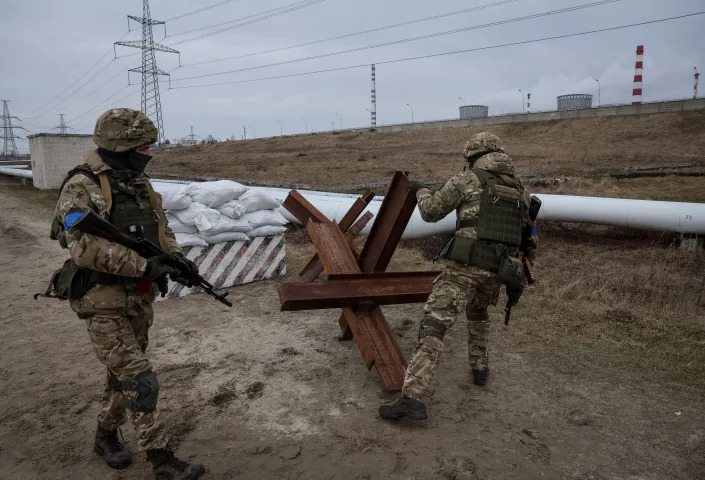
Ukrainian servicemen in joint drills near its border with Belarus on Feb. 11. (Reuters/Gleb Garanich)
In April 2021, Russia deployed its troops to the Belarus-Ukraine border, presumably in preparation for its forthcoming attack the following February. “In the summer of 2021, it was assumed that in six months at the latest, Ukraine would have been defeated and a puppet government installed,” a Western intelligence source explained. “Everything that the Kremlin planned for Belarus, according to the paper, would certainly have been implemented then.”
Russian troops invaded northern Ukraine from Belarusian territory on Feb. 24, 2022, making a play for Kyiv. Belarusian military installations have been used ever since to fly Russian aerial sorties and launch Russian cruise missiles and drones into Ukraine. Some Western observers have gone so far as to characterize Belarus as a legal co-combatant in Russia’s war of conquest. Following Russia’s invasion, one Western diplomat to the United Nations told Yahoo News, “Putin keeps asking Lukashenko to go in, and Lukashenko keeps telling him he needs ‘three more weeks.’ Then three weeks pass and Belarus still hasn’t gone to war. And so the cycle repeats itself, comically.”
Ukrainian officials, meanwhile, have been hot and cold on the likelihood or inevitability of fighting two invaders. “We understand Belarus's efforts are to support Russia and refrain from joining the war themselves, but we also know how much Russia is pressuring them," Andriy Chernyak, a spokesperson for GUR, Ukraine’s military intelligence agency, told the British broadcast network ITV last week.
There have been a few telling episodes, too, of Belarus signaling its stated desire to remain, if not neutral, something short of an active participant in the carnage in Ukraine. In December 2022, a Ukrainian missile attempting to intercept a Russian one landed in Belarus. The incident caused no hiccups in Belarusian state propaganda, which might have otherwise easily turned this into a pretext for attack. Lukashenko has even publicly thanked Ukraine for not submitting to what he characterizes as Western pressure on Ukraine to strike back at Belarus.
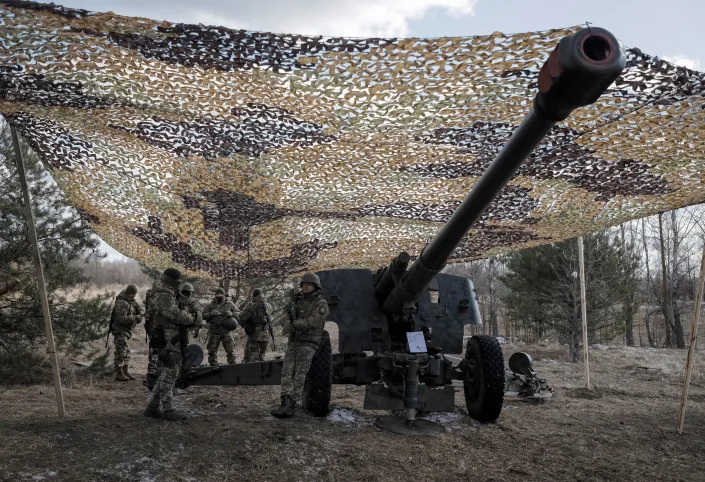
Ukrainian servicemen at the border with Belarus on Sunday. (Reuters/Ivan Lyubysh-Kirdey)
He is said to be acutely aware that deploying Belarusian troops across the border would be unpopular and destabilizing to his rule. Acts of sabotage along Belarusian rail lines have been frequent since the start of the war, as have hacks waged by exiled Belarusian IT experts that have halted train cargo carrying materiel to the front. Piotr Żochowski, a senior fellow at the Department for Ukraine, Belarus and Moldova at the Center for Eastern Studies, a Warsaw-based think tank, said: "Lukashenko is trying to build his public authority by telling Belarusians that they will not fight on foreign soil. He just keeps repeating the phrase: ‘If we are attacked, we will defend ourselves.’”
But Lukashenko’s political bind has only tightened as Russia’s invasion of Ukraine has faltered. Belarus remains a giant backstop for Russian forces, which have been engaged lately in training newly mobilized Russian conscripts on Belarusian soil.
The war in Ukraine has evidently slowed down the pace of implementing the Kremlin’s plans in Belarus. However, the war has by no means halted them. “The long-term goal to achieve total control over Belarus is still in force and hasn’t changed,” the Western intelligence officer told Yahoo News, adding that Russia continues to bank on its articulated strategy for the Union State and is still working to achieve its benchmarks. “Russia is aware that Belarus is trying to torpedo these processes,” the officer said. “Some of that is visible publicly, for example dragging out the political integration process. Russia continues to pressure Belarus regardless.”
Sergiy Kyslytsya, Ukraine's permanent representative to the United Nations, told Yahoo News: “Belarus is already a de facto Russian colony. And Lukashenko is in a Catch-22. The Russian invasion of Ukraine left him with no options. Putin doesn’t like him. His days are numbered. Lukashenko knows that well."
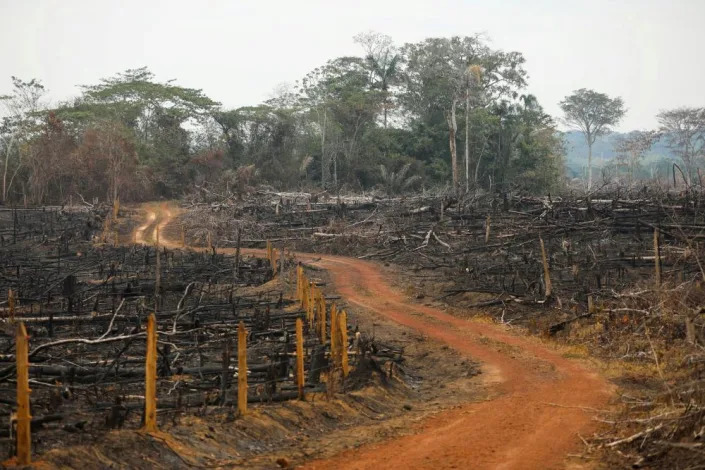
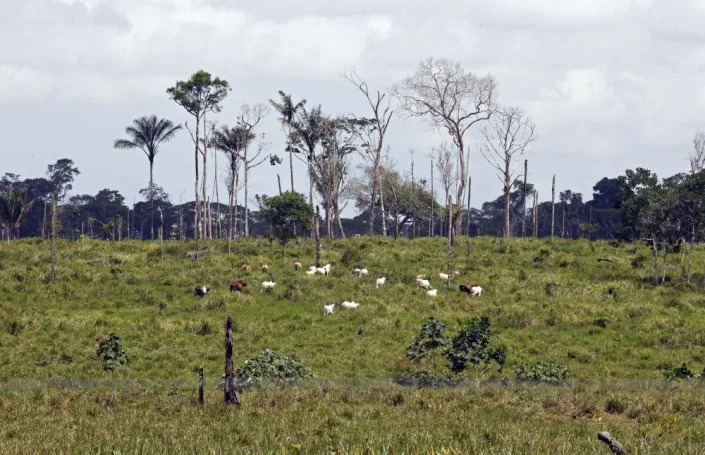



.png)
